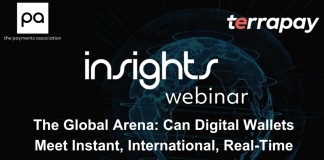Berlin’s first fintech festival, FIBE, was intended as a spring festival. Alas, the (typical Berlin) weather failed us, but the mood was quite upbeat.
What was hot, and what was not? Let’s take a look.

Conference Vibe and Focus
The FIBE festival was not just a conference. It was a vibrant gathering that took place in Messe City Cube Berlin. The German fintech scene, in a lively “class reunion” fashion, turned the two-day event into a buzzing hub of energy. The atmosphere was exciting, with discussions, networking, and a palpable sense of camaraderie in the air.

Crucial topics such as AI trends and regulations, crypto’s place in the trend scale, and the state of venture capital were at the forefront of the program. The presence of Germany’s fintech celebrities, including N26, Qonto, Scalable Capital, and IDNow, added to the significance of the event.
The more unconventional parts of the event included a miniature golf course, cocktail sample stands, Späti Kiosk (a snack shop), painting areas, a DJ booth, politicians, and interesting masterclasses.
Several side events took place during the event, including Visa’s invite-only Pre-Party at the Watergate Club, a gathering by The Connector, the Mastercard & Swan Embedded Finance Event, and the official event afterparty featuring Mathias J. Klenk aka Aven, Mateo Nikolli, and Brandon T. Downes aka djPoppy. As Laura Branigan’s “Self Control” remix started playing, the “Berlin vibe” took over the dancefloor.
Combining traditional and “neo-finance” elements made FIBE the perfect Berlin event!
Conference Highlights
Compared to other fintech conferences, FIBE was neither extensive nor small. It is fair to say that the size made the event very manageable from a networking point as it featured all the relevant ecosystem players. One of the key highlights was the participants’ openness, enabling easy and friendly conversations during the two-day event. Kudos to the FIBE team for setting up the networking mood!

It’s not every day that start-up founders can get face-to-face time with the German regulator. During FIBE, BaFin experts offered 1-1 time to Founders via their “pop-up regulatory stand” and answered questions such as, “Do fintech founders need a license from the financial supervisory authority BaFin for their project?” “What requirements do they need to fulfill?”
According to the announcement on their website dated 02/05/2024, the event was “really great” for BaFin experts.
Although BaFin’s direct communication with entrepreneurs is highly positive, don’t rush to your lawyer for a license application just yet. According to the word on the FIBE street, there are still extensive waiting times and unexpected requirements to consider during applications, making the process potentially more prolonged and, therefore, costly. Several entrepreneurs during the conference expressed their distress with the ongoing BaFin processes during private conversations, so longer preparation times and solid advisory support are recommended.
Further non-official talks during FIBE revealed the continued volatility of the venture capital environment. The smaller players complained about the lack of access to capital and continued mass layoffs in Germany. Regardless, there was hope that things would improve as of summer.
Two in-demand talks included Robert Habeck, Federal Minister for Economic Affairs and Climate Action, and Sanna Marin, Former Prime Minister of Finland. Sanna Marin’s talk focused on Russia’s invasion of Ukraine. Marin’s keynote reminded Europe to defend democratic values. Marin expressed concern over global political shifts and stressed the need for continued unity and support for Ukraine to prevent further conflicts.

Habeck, on the other hand, had a more local focus. He started his speech by expressing his expectation of entrepreneurs and start-ups using their power to benefit society and the climate.
Habeck also gently criticized the risk-averse German culture and urged investors to look into tech, regardless of their legacy investment cultures: “German investment is risk-averse. Investors always do what they have done before, but things must change. If your grandfather is rich because of shipbuilding, don’t only invest in ships but also invest in AI models.” According to Habeck, the real challenge is not having enough money in Germany but not having the right investment culture “as the money is held back/not spent. It’s not for the right reasons. If I had the power, I would give the incentive to spend the existing money not next year, not the following year, but now.”
Habeck also briefly talked about the immigration culture in Germany. He believes that Germany currently has the most welcoming immigration policy in Europe. He also believes that although it is easy to move to Germany, the conditions are not quite optimal. “You have to like the country you are coming to. Ideally, the country should tolerate differences and be open. If you speak English or broken German, that should be accepted and encouraged.”
Robert Habeck’s talk was, no doubt, heartening for all the expats in the crowd, as the event attendance confirmed the increasing expat workforce in the German financial services ecosystem.
FIBE 2025
If you suffer from FIBE FOMO, you can watch the FIBE talks and pitches via the official website. The good news is that FIBE will be back next year. You can plan and contact the FIBE team for next year’s event, which is scheduled for April 9th and 10th. We’ll be there!


Salih Gündoğmuş, representing London & Partners, the official business growth and destination agency of London, wanted to pass the message along: “London & Partners is dedicated to supporting tech companies across Europe in their expansion to the London market. If you’re interested in an international expansion and London is on your radar, reach out to us to benefit from various services.”




